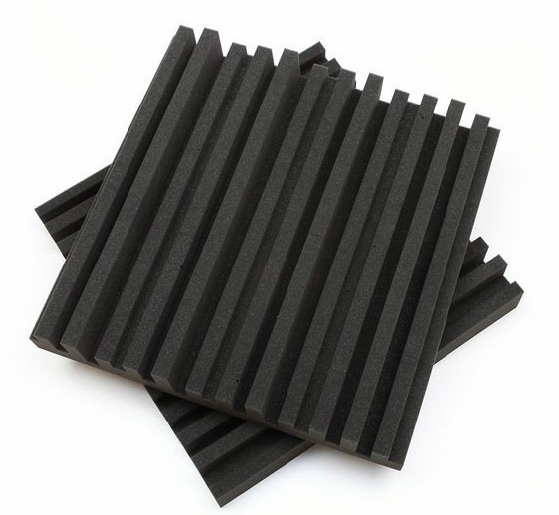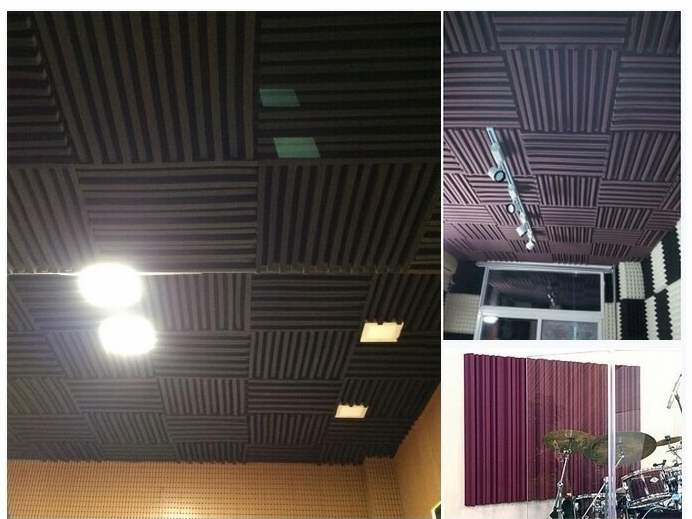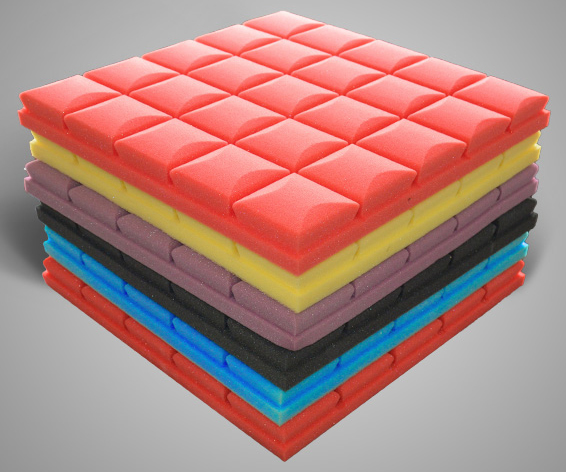Acoustical Foam
กก
Acoustic foam - you should know that!
It is important for you to know what makes a good acoustic foam so that
you will not be misled by the many offers on the Internet.
Because unfortunately, a lot of practical jokes are driven in this area
and we experience it again and again that here often wrong advice is
given or in the
product descriptions untrue statements are made. Once
assembled, you can not return the foam and you may have to live with the
result, even if it would have
been better solved with other materials.

Take five minutes to find out how to differentiate between a good and a
bad acoustic foam, or where to choose a cheaper foam over a more
expensive acoustic foam.
And you'll also learn how foams help improve
the sound or how you can effectively insulate walls.

What is an "acoustic foam"?
The word "acoustic foam" is in the strict sense an invention of the
industry - because a foam pad or a mattress has an acoustic effect, due
to the open-pore nature of the foam.
With these types of foam, which are
designed as upholstery, but you can solve acoustic problems not
targeted, i. you do not know what the result will look like in the end.

There are no measurement tables with frequencies or the like and also no
experience, with which one can exchange in forums,
because you will
hardly find anyone who moved a mattress in the recording studio on the
walls. Acoustic foams are foams specially designed for the acoustic
sector,
with different surface finishes, plate thicknesses, weights,
pores, colors and profile ground conditions. Depending on the acoustic
problem case,
proven foams are used or are recommended, with which one
can solve the problem purposefully.
There are two basic acoustic applications: Hall reduction within rooms
or sound insulation or noise insulation between rooms, ie the prevention
of sound passing
through solid surfaces, e.g. in a soundproof apartment
or a soundproof waiting room or office (and also in the technical field
in the insulation of machinery,
compressors, etc.). This is referred to
as sound attenuation (within a room) and sound insulation (between two
rooms, for example).
Click on Difference of sound attenuation and sound
insulation for exact details.
Which acoustic foam do I need for my problem?
If you want to reduce the reverb in your room:
... you need e.g. Puff foams or pyramid foams (with these profiled
foams, however, they only reduce higher frequencies) or even better flat
absorbers without profiling,
which absorb sound over all frequencies and
also act in the low frequency range. Pimples and pyramids are therefore
often found in recording studios or music rooms,
if you only want to
eliminate certain frequencies. Plane absorbers, on the other hand, are
best used in areas where you want to absorb as much as possible.
in the
office, restaurant, waiting room, bowling alley, kindergarten, schools,
universities etc.
Absorbers will always absorb significantly more in comparable plate
thickness than equally strong dimpled or pyramid foams.
It is also
important to pay attention to the fire protection of the acoustic foams,
which you must or want to meet on site. We carry different products with
different fire protection levels. Our Basotect acoustic foam here has
e.g. the highest standard and may i.d.R. be used everywhere (in case of
doubt, always check on-site).
All of these products can be found above.
It is a misconception that you need profiled surfaces to dampen noise.
The plate thickness is crucial and not the surface area of the
individual plates, as many claim.
This is clearly proven by
measurements. Many confuse the surface of a panel with the overall
surface of a room in m²! Of course,
the total surface area has an
important influence on the overall absorption. The more misplaced, the
less reverb you have.
In addition to these classic profiled or non-profiled plates, there are
still specialists such. Bass absorbers or broadband absorbers that
absorb
especially in the low-frequency range. And of course you do not
necessarily have to take rectangular plates to reduce the reverb - you
can also use circles,
ovals, stars or other shapes. Only the panel
thickness and the number of total absorbing surface on the ceiling in m²
are decisive. Furthermore,
we also carry acoustic images or ceiling
panels and partitions, for the office area. In our online consultant you
will find many standard problems with
our recommendation of products,
number, plate thicknesses etc ..
If you want to effectively dampen noise ....
Then you will not get far with bubble foam or pyramid foam. Also in the
field of insulation falsely pyramid foam or nub foam is recommended
again, although they can work, but in comparison to more suitable
materials have a downright ridiculous effect. To insulate properly -
whether a room wall, a machine or engine - you need plane absorber with
high weight. Because only mass and plate thickness will effectively
prevent the sound waves from propagating or penetrating walls.
This area is covered by e.g. our products in the category sound
insulation. Here you will find massive acoustic foams, such as our very
popular composite foam in various thicknesses as well as other
supporting materials such as bitumen foil or bitumen board, which
additionally dampen the noise or deceive metal surfaces. Details can be
found there if you need effective insulation. And we produced our
in-house wall insulation kit, which effectively insulates walls later
(for example to the neighbor).
How do I recognize the quality of a foam?
Not only on the product description, but also in the case of reputable
suppliers. Sounds strange, but it is. All traders boil only with water
and the basic ingredients e.g. with PU foam nunmal are the same
worldwide. You can cheaply produce and foam the puff foam or pyramid
foam of the same name or you can use high-quality foam with
higher-quality foam or you can thin the bottom of profiled foams and cut
the pyramids and nubs very high - saves material, but then significantly
reduces the effect.
The problem is - in both cases it means in sales then "bubble foam" or
"pyramid foam", etc. You can assume that absolute low prices that are
far away from the average price, even with almost 100% guarantee, are
bad foams that will not be of much use to you acoustically - or a trader
sells or closes and lowers the prices and you have if necessary a real
opportunity. Unfortunately, there is the other case: some traders charge
for a bad or mediocre foam an exorbitant price - this can e.g. be due to
the storage costs, which the dealer has or because he is not specialized
or no large volume converts and next to foam still flowers and postcards
sold or foam as a marginal product and few sales at a high price are
sufficient.
For this reason we usually offer different qualities for the most common
acoustic foams. Our solid Eco quality (cheap but not cheap!), Our very
high quality MicroPor quality with very fine pores and very good
absorption and also flame retardant equipped and our high-end product of
Basotect, which absorbs excellent, is flame retardant and does not
yellow.
Foam storage - the expert in "acoustic foams"
If our selection "kills" you best use our large online consultant - many
topics are already described very accurately and appropriate acoustic
foam recommended. You can then order these directly online from us. We
not only have the largest selection, but also low prices and fast
delivery from stock - almost all materials that you can find in our shop
are also available in larger quantities. Note the delivery status
display for the articles. Order your acoustic foam with just a few
clicks directly from us. And as with all materials in our shop, we
manufacture our foams completely in Germany - from the foaming of the
acoustic foams to the final cut - this guarantees a high quality, long
life, best absorption and an environmentally friendly manufacturing
process. Quality "Made in Germany".
More information about our acoustic foams can be found in our foam blog
- Topic: Acoustic foam and our complete foam program can be found on the
start page.
.
Free
กก
กก